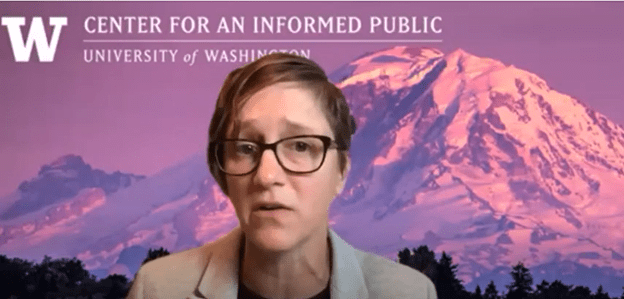As the University of Washington’s Center for an Informed Public approaches its second anniversary, the multidisciplinary research center’s five co-founders hosted a virtual event and panel discussion on Nov. 4 to highlight the CIP’s work and key accomplishments from the past two years, insights from ongoing projects and priorities for the years ahead.
“The Center for an Informed Public has taken shape around this critical challenge to address misinformation, disinformation, and other strategic manipulation, especially as they’re facilitated and shaped by sociotechnical systems and the cost of societal harms to things like public health and democracy,” said Kate Starbird, a UW Human-Centered Design & Engineering associate professor who recently started a two-year term as the CIP’s faculty director.
Starbird, who discussed her goals for the center in the coming years, was joined by the CIP’s four other co-founders — School of Law professor Ryan Calo, Information School associate professors Emma Spiro and Jevin West, and iSchool senior principal research scientist Chris Coward — for a follow-up discussion moderated by HCDE professor and chair Julie Kientz.
“This is important but difficult work. These problems can sometimes feel like an insurmountable challenge, a looming mountain of BS and division casting a long shadow across our lives. At times it can feel overwhelming, and I know personally, I felt that way on occasion,” Starbird said during her remarks. “But when we look around the CIP and across the networks we’re building and the work we’re all doing, when we truly take stock of all the brilliant people who care so deeply about this problem and about each other. It doesn’t seem so insurmountable after all.”
Continuing to Build Understanding Around Mis- and Disinformation
The center’s No. 1 priority, as Starbird pointed out, is the CIP’s research. Through research, CIP-affiliated faculty, postdoctoral fellows and students at the CIP will continue to understand how and why mis- and disinformation spreads, why the public is vulnerable, and how to mitigate these challenges. The work will extend the focus on current systems — social media, online advertising, and online marketplaces — and how they contribute to harmful misinformation and scale strategic manipulation.
“We will work to generate, develop, and evaluate ideas for how to make these systems better, healthier, and less toxic, and begin to design entirely new paradigms for online interactions that allow for healthier and more truly democratic discourse,” Starbird said.
Expanding upon multi-institutional research collaborations tracking voting-related mis- and disinformation before, during and after the 2020 U.S. elections, Starbird said the CIP plans to continue its rapid-response research efforts to identify, analyze, and address emergent disinformation campaigns that undermine the public’s trust in democracy. Those rapid-response research efforts, supported with funding from the National Science Foundation’s Secure and Trustworthy Cyberspace program and Craig Newmark Philanthropies, will be done in collaboration with researchers at Stanford University.
Support Communities to Develop Resources of Resisting Misinformation
As two of the CIP’s four foundational pillars, Education and Engagement are additional priorities Starbird highlighted. Through educational programming and community engagement, she said her goal as director was for the CIP to support communities in developing resources to protect themselves from harmful mis- and disinformation and better understand what and why they’re seeing in their social media, news and content feeds.
“We plan to continue to work with community partners to build robust and customized programs, resources, and toolkits for educating and engaging with the public, including journalists, educators, and groups that are specifically targeted from veterans to election officials to historically marginalized and minoritized communities,” Starbird said.
A secondary goal is to help connect insights from education to online platform design, so that platform transparency can support future generations in making better decisions about the content they consume and share.
Protecting and Supporting the CIP Community
When the CIP was officially launched in December 2019, just weeks before the first COVID-19 cases were detected in North America, it was hard to imagine just how much the world and its information environments would change during the tumultuous, stressful and uncertain events of 2020. Starbird said that CIP researchers have been spending many hours sorting through sometimes distressing and challenging online content and understanding the dynamics of mis- and disinformation, which can significantly impact their emotions and well-being. For the next two years, Starbird is committed to working with the CIP community and research colleagues at other institutions to develop resources and practices to care for researchers’ safety, mental health, and well-being.
“It’s incredibly important that we support our researchers in this work,” Starbird said. “We hope to share insights with the broader research community, including those in academia, journalism, nonprofits, and others wading through this content because we’re all in this together.”
Creating a Better and More Just Future
Lastly, Starbird emphasized to continue prioritizing the impact — on the public’s understanding of the challenges, the role of online platforms in mis- and disinformation, and the legal framework to address the problems. To shape systems that support public health, science, democracy, and justice for future generations, the center will continue to recruit, train, and mentor junior scholars to be the foundation of this emerging field, as well as to increase diversity in the center and support equity and inclusion across CIP’s partnership and through research.
“When we reflect upon the problems of dis/misinformation, issues of equity and justice are at the very core,” Starbird stated. “Our goal at the center is not to restore some mythical ideal past, but to help construct a better and more just future where people are better equipped to access and share information to organize around issues like racial, economic, and environmental justice, and to speak truth to power and where we are also individually and collectively more resistant to misinformation, propaganda and manipulation.”



